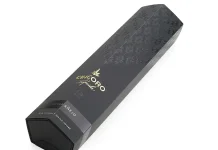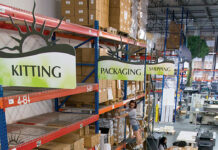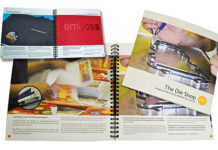by: Staff
Although this magazine’s focus is usually U.S. binderies, the appointment of Richard Senior of Duraweld Ltd. as incoming president of the BIA provides an opportunity to take a look at operations across the pond. Located in Scarborough, England, Duraweld is making exciting strides in mass customization of loose leaf products, primarily in polypropylene.
Fifty Years of Growth
Duraweld was started in 1959 in Scarborough, in the Northeast corner of England with a specialization in making book jackets and gramophone disc sleeves, together with wallets and pockets for the northern mortgage lenders and the government’s stationery office. In 1971, Duraweld was sold to London-based Mac Plastics, run by Richard Senior and two partners. The amalgamation of the two companies gave it a broader customer base and, with the increased sales, the opportunity to enhance automation. Mac Plastics also was dedicated to making ring binders and deed wallets for mortgage lenders, and it was only a short period before all of the company’s production was centered in Scarborough.
Using the Duraweld name, the company progressed steadily throughout the 1970s, both by acquiring and absorbing companies in London and the Midlands, and by purchasing its first Fiab in-line automatic machine capable of foil stamping, welding, and hot knifing. The in-line was soon in continual use making deed wallets and, with the increased throughput in the Scarborough factory, the lack of space became an ever-increasing problem. A plot of land was purchased and the first stage of a new factory was built in 1980 with 10,000 square feet of production space. Within two years of moving, two more Fiab triple-head in-lines were added and the first of the robotized English-made HFW rotary machines was introduced. In 1985, a new warehouse was built onto the factory and the silk screen printing division was moved into another new factory nearby. Four years later, an additional 15,000 square feet had to be added for further machine space and for the constantly-growing stock.
Today Duraweld uses simple hand-fed platen presses, primarily Crossland equipment, for its polypropylene production, but the company is in the process of building robotics to feed, take out, and strip in small runs. Branson ultrasonics are used to apply pockets, or in assembly processes. The screening division uses Svecia equipment with UV drying tunnels, and the newly-installed digital press is an Arizona 250, which prints on any untreated vinyl, poly, or polypropylene.
Changing Directions
By the end of the 1980s, Duraweld had become one of the largest heat sealers operating in the banking, mortgage, and government sectors. However, one piece of work made the company stop, think, and change its entire working practices.
In 1989, the postal service decided to give a plastic wallet to everyone who regularly used the postal offices to collect government pensions, savings, or welfare benefits. Since the order was so large, five United Kingdom companies were given orders, which amounted to millions of wallets. “We didn’t realize until later that the U.K. companies only had half the order – the other half was produced in China,” said Richard Senior, president of Duraweld. “Unfortunately, the China-produced product was good, half the price of the wallets created in the U.K., and delivered on time.”
The realization that China could successfully compete with Duraweld for large orders, and that the market was going to drastically change, triggered a radical change in company philosophy. Duraweld chose to focus on small- to medium-sized companies with orders that were too small to be produced cost-effectively in China. This thinking meant that the company had to completely revamp its office operations; instead of undertaking one or two quotes per week, Duraweld would have to be capable of handling hundreds. Similarly, instead of having a forward order book spanning months, production planning and the forward order book would be days or weeks. One of the solutions was software-based. “We realized that this would need some fairly sophisticated computerization,” explained Senior, “and being unable to buy off-the-shelf packages we began writing our own program, which finally went live in October 1992.”
The move from mass production to an influx of small orders also meant that Duraweld had to reassess its production process. The concept of Mass Customization was launched. “Ring binders became the first product where standardization of size and the way that we set the machines allowed us to produce a good, reasonably-priced product very efficiently,” stated Senior. The move to Mass Customization involved standardizing the sizes of binders, pockets, wallets, and folders. Then when a customer requested a product that was not one of Duraweld’s new ‘standard’ sizes, a small discount was offered to move customers from their existing sizes to the new Euro sizes (as Duraweld christened them). This enabled the company to gradually build up longer runs of its standard sizes, where a production run of 10,000 binders could involve seven or eight different orders with different colors and different print. “Since we were using the same equipment, there was little training required,” said Senior, “and our customers liked the better prices with faster service.”
The concept flourished and Duraweld’s binders, under the brand name of Binderfast, were followed by Easitabs. After two years of planning, the company created a new brand called Polyproportunities, producing binders, files, folders, and wallets in polypropylene, a softer version of the polyethylene that is commonly used in the United States. Today, Duraweld’s 35,000 square foot plant runs 24 hours a day, Monday through Friday, with 100 staff members and no salesmen on the road.
Keeping Ahead of the Pack
The concept of a quality, well-serviced, middle-of-the-road product has served Duraweld well, but a new challenge is on the horizon. With its early software running out of support, the company has begun to install a new software package, which will take six months for full introduction. Duraweld previously used software that was essentially a blank canvas, which enabled the company to program the calculations required to do estimating, creating text around each of the calculations to produce a description and quotation from the input of basic data. The same calculations were used to process the work orders. “We were able to integrate accounts, stock, and CRM; and whilst it was a non-Windows-based product, it was remarkably fast,” Senior said. “Its main drawback was that any additions to the system were fairly longwinded because the programmers had to go back to the beginning and flow all the way through the system.” The new software, based on an American program called WinMan, was chosen because of its ability through the configurator to do the calculations and descriptions, while still offering Duraweld the opportunity to customize it according to the company’s needs.
Duraweld also has decided to broaden the base of fully-automatic quotations and work order production to include pockets, wallets, files, and folders. “This has forced us to re-examine our production techniques,” explained Senior. “Much to our surprise we found that, for example, with a little lateral thinking we can auto-quote and manufacture pockets any size between 26″x18″ and 1½”x1″, open long or short, and in 1/8″ increments using only 166 non-modifiable tools.”
Duraweld understands that in the current competitive climate, a company won’t be successful by simply adding new software – it must keep ahead on multiple fronts. Two years ago Duraweld pioneered the recycling of all its own polypropylene waste back into sheet form. Duraweld collects, sorts, and granulates in-house and then sends 20 tons at a time to processors who convert the granulate into sheet. At the moment, the process is exclusive to Duraweld. Although recycling post-industrial waste is not yet mandated in Europe, the political and commercial pressures are growing and disposal costs of waste are doubling every year.
In addition, Duraweld recently introduced Japanese manufacturing processes, incorporating Kanbans and 5S. The 5S process requires the following: Clear Out (Seiri), Organize (Seiton), Clean (Seiso), Standardize (Seiketsu), and Discipline (Shitsuke). This has led to a cleaner factory, less waste, and greater production efficiencies, and also has enabled Duraweld to speed production and delivery times with fewer staff members.
Gaining Perspective
Duraweld is one of the few European companies that is a member of the BIA, a membership spanning nearly 20 years. “We find one of the most interesting benefits of the BIA is the ability to talk openly and frankly with people who would ordinarily be competitors, but due to being on different continents are not,” said Senior. “Rather, we exchange useful information, learn, spot trends, and have the opportunities to visit factories – not the practice with normal competitors!”
Senior also acknowledged the benefits in gaining a new perspective on suppliers. Duraweld recently had a problem with one of its supply lines, and while talking over coffee at the BIA, Senior was advised of a subsidiary of an American company that he did not know existed.
Unfortunately, there is not an organization similar to the BIA in Europe. “Since Europe is made up of different countries, all speaking different languages, the communication in what is seen as a fairly parochial industry is almost non-existent,” explained Senior. “The only time we meet a continental competitor is at an exhibition – even suppliers’ product launches are based on individual country launches.”
The more cooperative environment in the U.S. can only lead to a stronger industry, especially as binderies struggle with competition from China. Duraweld believes it has implemented a solid strategy, choosing a specific concept to follow, while not forgetting the occasional niche market.
As Senior begins his role as president of the Binding Industries Association, he has issued an open invitation to those across the pond. “It goes without saying that if anyone reading this is planning to visit England, there is an open welcome to visit our plant.”




